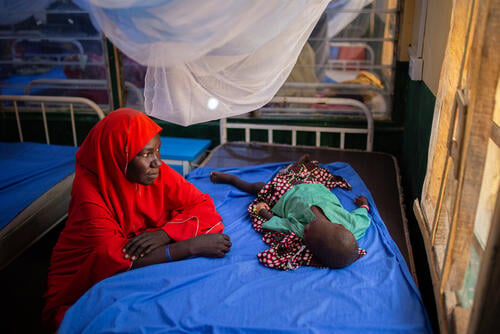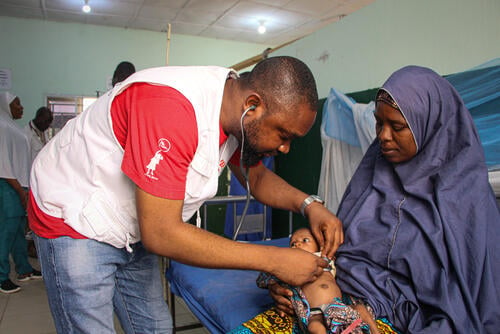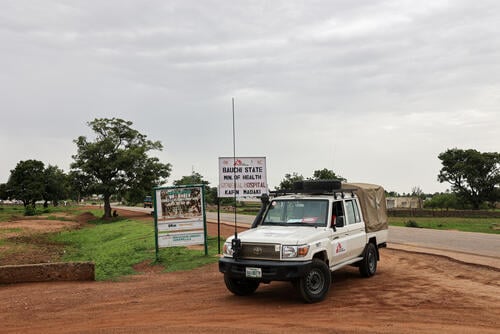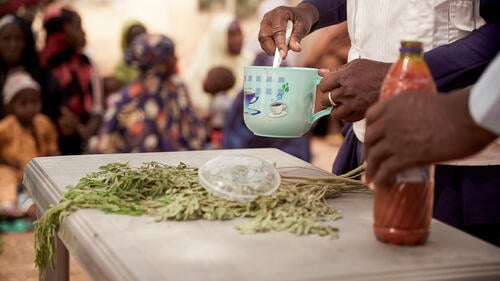- Violence, malnutrition and disease have added up to a severe humanitarian crisis in northwest Nigeria.
- A lack of engagement from humanitarian groups and donors, and formal UN recognition of the crisis, are delaying an adequate response.
- MSF urges calls upon the humanitarian community and Nigerian government to immediately respond to the crisis in the northwest Nigeria.
Abuja – The level of humanitarian support available to respond to people’s critical needs in northern Nigeria is in dramatic decline. In the northwest, a humanitarian crisis persists, with catastrophic levels of malnutrition and recurrent outbreaks of preventable diseases, says Médecins Sans Frontières (MSF). Yet, the situation is largely being ignored by donors and aid organisations.
Over recent years, more than 600,000 people have been displaced from their homes in northwest Nigeria as a result of extreme violence, deteriorating economic conditions, and climate change. Despite encouraging signs of mobilisation from humanitarian groups and donors in 2023, MSF says that the funding and aid currently available are vastly insufficient for people’s growing humanitarian needs.
While both northeast and northwest regions remain affected by high levels of malnutrition and preventable diseases, the non-inclusion of the latter in all previous Humanitarian Response Plans (HRP) is alarming.
“We have repeatedly expressed our concerns to the UN and donors about the alarming and deteriorating humanitarian crisis in the northwest,” says Ahmed Bilal, MSF head of mission. “The lack of recognition of the crisis is having a severe impact on the health and humanitarian needs of people, and is delaying the response, which is desperately needed.”
For the northwest last year... a series of opportunities have been missed and the same cannot happen again in 2024... This year might become the worst year yet.Dr Simba Tirima, MSF country representative
People living in Zamfara, Sokoto, Katsina and Kebbi states, all in the northwest, have been hit by the persistent violence, mainly armed banditry and kidnappings. Last year, more than 2,000 people were killed in more than 1,000 violent incidents in the region, according to the Armed Conflict Location & Event Data Project. As well as being displaced from their homes, people have lost their livelihoods, and are often no longer able to reach their farms for security reasons. They struggle to find food, and accessing healthcare and other basic services has become increasingly difficult and dangerous.
The crisis has seen rates of malnutrition and other diseases spiral. It is estimated that around 2.6 million children have severe acute malnutrition in the country, of whom 532,163 are in Sokoto, Katsina and Zamfara states, according to national surveys conducted by UNICEF and authorities.
Last year, MSF medical teams working in Kebbi, Sokoto, Zamfara, Katsina and Kano states treated 171,465 malnourished children as outpatients and admitted 32,104 children for life-threatening severe acute malnutrition – a 14 per cent rise on the previous year. In Katsina, our teams found high levels of acute malnutrition in 2023 with 17.4 per cent of the surveyed children suffering from acute malnutrition in Jibia local government area at the beginning of the lean season – not even when access to food is the most difficult.
The high rate of admissions to inpatient facilities has been accompanied by alarming mortality rates. In one of our supported facilities in Zamfara state, it reached 23.1 per cent. Sadly, many children are dying within 48 hours after arriving in critical condition, too late to be saved due to the barriers in reaching healthcare. Overall, 854 children admitted to MSF facilities in the northwest died 24- to 48-hours after admission in 2023.
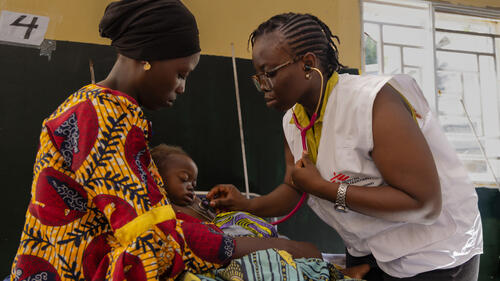
When people fall sick, their families are forced to weigh up the risks of travelling to a health facility against staying put without medical care.
“I cannot recall how many times my village has been attacked,” says Aisha, whose baby is receiving treatment for malaria at an MSF health facility in Gummi, Zamfara state. “We are afraid to travel, but we had no choice, as my baby was very ill and the clinic in my village is short of health staff and medications.”
Outbreaks of preventable diseases, including malaria, cholera, meningitis, measles, and diphtheria, are recurrent and widespread. In 2023, MSF teams in northwest Nigeria treated 169,954 cases of malaria, 4,462 cases of cholera, 1,548 cases of meningitis, 1,850 cases of measles and 13,290 cases of diphtheria.
For aid agencies, security constraints are making it increasingly hard to gain access to certain areas, while escalating violence is impacting and sometimes preventing their work. Last September, our teams in Zamfara state were forced to stop supporting an inpatient malnutrition facility in Anka, and in December, MSF staff were temporarily evacuated from Zurmi due to heavy fighting taking place next to the hospital.
The lack of recognition of the crisis is having a severe impact on the health and humanitarian needs of people, and is delaying the response.Ahmed Bilal, MSF head of mission
In 2023, there were some small signs from donors and aid organisations of increasing interest and mobilisation in northwest Nigeria. However, the funding has not been forthcoming and, in a climate of global aid cuts, the few aid agencies working in the region do not have the capacity to scale up their work.
“We are very alarmed about forthcoming reductions in funding activities for some organisations amid global cuts to humanitarian assistance,” says Dr Simba Tirima, MSF country representative. “While MSF does not rely on governmental or institutional funds for our activities, this is not the case for most aid organisations in the northwest, whose funding depends heavily on the UN’s Humanitarian Response Plan.”
“There were hopeful signs for the northwest last year, but a series of opportunities have been missed and the same cannot happen again in 2024,” says Dr Tirima. “This year might become the worst year yet in terms of humanitarian needs and suffering for people.”
In order to alleviate the suffering of vulnerable communities, MSF believes that priority should be given to preventing and treating malnutrition, and to vaccinating people against preventable diseases, including improving routine and catch-up immunisations and carrying out reactive vaccination campaigns in response to ongoing disease outbreaks. This is paramount for reducing deaths and illness among vulnerable groups of people, particularly children under five years of age.
Faced with the prospect of an alarming 2024, MSF calls upon the humanitarian community and Nigerian government to urgently mobilise across northwest Nigeria, where access is possible, to respond to this neglected humanitarian emergency.



